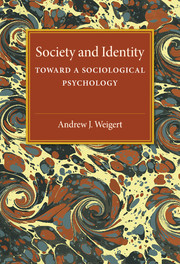Book contents
- Frontmatter
- Contents
- Preface
- Part I The story of whence identity and a step toward theory
- Part II So what? Applying and extending identity theory, and back to society
- 3 Applying identity theory to bodies: gender identity
- 4 Extending identity theory beyond bodies: prenatal and postmortem identities
- 5 Identity in a pluralistic society: some parting words
- Bibliography
- Index
4 - Extending identity theory beyond bodies: prenatal and postmortem identities
Published online by Cambridge University Press: 05 May 2010
- Frontmatter
- Contents
- Preface
- Part I The story of whence identity and a step toward theory
- Part II So what? Applying and extending identity theory, and back to society
- 3 Applying identity theory to bodies: gender identity
- 4 Extending identity theory beyond bodies: prenatal and postmortem identities
- 5 Identity in a pluralistic society: some parting words
- Bibliography
- Index
Summary
This chapter attempts crucial illustrations of identity as a social construction. In the first part, the concept of prenatal identity (PNI) is briefly described as a speculative notion that is real despite the absence of a separately embodied individual. Before an individual is born, most of his or her ascribed identities have already been established by family, friends, and society. Consequently, a baby enters the world with a predetermined identity repertoire, the self typified in infancy, merely waiting for a body through which it can be physically manifested.
While family, friends, and professionals await the arrival of the new social actor, others set about the task of constructing an identity for the invisible, socially unembodied fetus toward which their behavior is directed. We begin our discussion by introducing the notion of identities without bodies as a fundamental problematic in the sociological psychology literature. Secondly, PNI is described as a necessary preconstruction project by which the fetal object is endowed with meaning and potential selfhood. The process of preconstruction is exemplified by the social construction of a pregnancy identity, by the extension of medical technology to define conditions and characteristics of the fetus, and by the similarities between mourning for perinatal deaths and other grief adjustment processes. Finally, we briefly describe birth as a social event in which PNI is further objectivated through embodiment in situations and through formal introduction into the preexistent social structure. The second section of the chapter explores the existence, dimensions, and impact of postmortem identity (PMI) on contemporary conceptualizations of self-maintenance and biographical reconstruction.
- Type
- Chapter
- Information
- Society and IdentityToward a Sociological Psychology, pp. 92 - 114Publisher: Cambridge University PressPrint publication year: 1986



